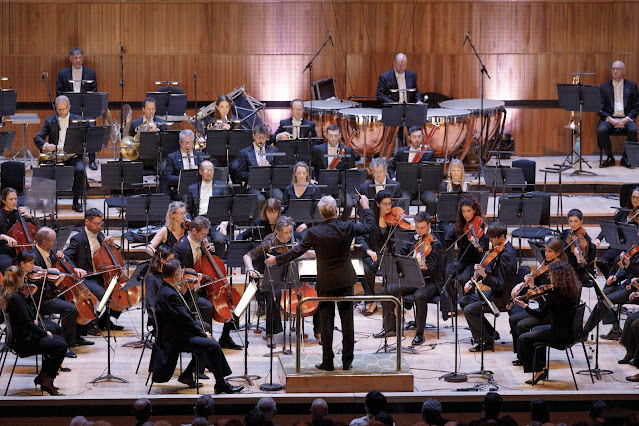Royal Festival Hall
Samuel Coleridge-Taylor: Solemn Prelude (London premiere)
Tippett: Piano Concerto
Elgar: Symphony no.1 in A-flat major, op.55
Steven Osborne (piano)
London Philharmonic Orchestra
Edward Gardner (conductor)
 |
| Image: London Philharmonic Orchestra |
Samuel Coleridge-Taylor’s B minor Solemn Prelude was written, at Elgar’s recommendation, for the Three Choirs Festival in 1899. It then went unperformed until a revival, likewise at Worcester Cathedral, for the same festival in 2021. It has now finally reached London, Coleridge-Taylor’s own city, in a fine performance from the London Philharmonic Orchestra and Edward Gardner. Its opening, in melody, harmony, scoring, and indeed the LPO’s performance sounded rather Tchaikovskian: surely a case of influence, though at the same time not to be reduced to that. Indeed, it was Russian symphonism more generally that came to my mind, Borodin too, than say the ‘solemnity’ of Wagner or Bruckner, one progression’s passing resemblance to Parsifal notwithstanding. It certainly qualifies as solemn, though, albeit in an amiable sort of way: a thoroughly professional piece of writing, that merits performance, especially with string sheen and generally rounded orchestral tone such as was heard here.
Michael Tippett’s Piano Concerto followed: a welcome outing for a piece rarely heard, yet likewise worthy of revival. Gardner, the LPO, and soloist Steven Osborne took us immediately to an imaginary landscape, in an imaginary (quasi-dramatic) context. Its first movement sounded very much as if a scene from an opera without words, yet not necessarily without action. The Midsummer Marriage naturally came to mind, but it was a world of its own we heard, inviting and full of fantasy. The piano part is anything but easy, yet rarely if ever showy; this is not the conventional (post-)Romantic battle of piano against orchestra, and did not sound that way. One delighted instead in the scene painted, almost as much by woodwind and celesta as by the undeniably brilliant soloist, celesta and piano almost equals in the cadenza. The slow movement was equally well-shaped, playing out in a related yet different world, as if a scene that followed. It was darker, a notturno given with an apt air of mystery, even ritual. Bearing in mind Tippett’s inspiration for the work as a whole, Beethoven’s Fourth Piano Concerto (which he heard Walter Gieseking rehearse), it was difficult not to think of Tovey’s evocation of Orpheus taming the Furies. The finale meanders at times, perhaps, but I doubt anyone minded much. It was sharp, bright, ultimately decisive—and it danced.
The onward tread to the opening to Elgar’s
First Symphony, hesitant then sure(r), ever imbued with ineffably Elgarian
sadness and nobility, can be traced in many ways. Gardner’s way convinced, as
did the response to it. A degree of Brahmsian sentiment could be perceived through
a related yet different orchestral kaleidoscope; crucially, sentiment was never
confused with sentimentality. Passages of hushed inwardness, especially in this
first movement, combined with wounded swager to captivate and propel. If an
occasional rough edge intruded, as with Tippett, it was nothing of importance.
Far more important were liminal passages of an almost Straussian, yet more
subtle phantasmagoria—and where they took us. The second movement’s opening
material, somewhere between diabolical and furious, was followed by a lifting
of clouds closer to the new vistas of Mahler than one might have expected. Music
between these poles combined their tendencies as well as having them do battle:
a matter of performance almost as much as of composition. A rich, even ripe Adagio
was perhaps a little indulged for my, arguably also for Elgar’s, taste, yet it
was difficult to resist the glorious LPO sound. Inflected by other material
that yet did not deflect the music from its path, there remained much to admire
here. Ghostly unease and lost recollections laid bare the compositional mastery
of the finale. It was a turbulent journey, in search of a home that was perhaps
never quite reached. The ‘cyclical’ qualities of Elgar’s writing were vividly
communicated here by Gardner, bringing it closer to César Franck than often one
hears. Was it ultimately a little hard-driven? Perhaps, but arguably it held to
its own logic.